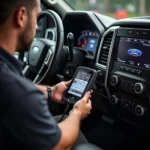Ever looked at a rusty old Ford Mustang tucked away in a garage and felt a spark? That, my friend, is the allure of a project car. It’s not just a hunk of metal; it’s a blank canvas, a whispered promise of automotive resurrection. Whether you’re a seasoned mechanic with a garage full of Snap-On tools or a curious newbie with a Haynes manual and a dream, project cars offer a unique blend of challenge, creativity, and the undeniable satisfaction of bringing a machine back to life.
What Makes a Car a “Project Car”?
The beauty of a project car is its subjectivity. What constitutes a “project” for one person might be a walk in the park for another. It could be a classic Chevrolet Corvette needing a complete engine overhaul, a sleek Porsche 911 begging for a modern infotainment system upgrade, or even a humble Toyota Corolla yearning for a fresh coat of paint.
From a mechanic’s perspective, a project car is an opportunity to dive deep into the intricate workings of an automobile. It’s a chance to hone existing skills, acquire new ones, and experience the joy of diagnosing and fixing problems firsthand. For someone with a passion for automotive design and aesthetics, a project car becomes a platform for personalization. Imagine swapping out those stock seats for racing-inspired buckets or adding a custom body kit to turn heads on the streets of Miami.
Economically speaking, project cars can be a double-edged sword. Done right, restoring a classic car can be an investment, with models like the Ford Mustang Shelby GT500 or the Mercedes-Benz 300SL Gullwing appreciating significantly over time. However, it’s easy to underestimate the costs involved. Parts, tools, and unforeseen repairs can quickly add up, turning your dream project into a financial headache.
Navigating the Project Car Journey
So, you’ve decided to take the plunge and embark on your own project car adventure. Where do you start?
1. Define Your Scope and Budget:
This is arguably the most crucial step. Are you looking for a quick weekend project or a multi-year labor of love? Are you comfortable with basic mechanical tasks, or do you envision a complete frame-off restoration? Setting realistic goals and a clear budget will save you potential heartache and financial strain down the line.
2. Choosing the Right Car:
Your project car should speak to you. Do your research, browse online forums, and attend local car shows to find a model that resonates with your interests and aligns with your skillset. Consider factors like parts availability, community support, and potential resale value.
3. Acquiring Knowledge and Skills:
Don’t be afraid to get your hands dirty! Invest in a good set of tools, subscribe to automotive magazines, and join online communities dedicated to your chosen car model. As automotive expert and author, Emily Carter, aptly puts it in her book “The Garage Guide”, “The best way to learn about cars is to work on them.”
4. Sourcing Parts and Tools:
The internet has revolutionized the way we source parts. Online marketplaces, specialized forums, and even social media groups can be goldmines for finding rare or discontinued parts. Invest in quality tools; they will pay for themselves in the long run.
Common Project Car Challenges (and How to Overcome Them)
Every project car comes with its fair share of hurdles. Here are a few common ones:
1. Rust:
Rust is the arch-nemesis of any car enthusiast. From surface blemishes to structural damage, rust can quickly derail a project. Early detection and treatment are key. Wire brushing, sanding, and rust converters are your weapons in this battle. In severe cases, professional media blasting might be necessary.
2. Electrical Gremlins:
Old wiring harnesses, faulty sensors, and corroded connections can lead to a myriad of electrical problems. A multimeter, wiring diagrams, and a healthy dose of patience will be your allies in diagnosing and resolving these issues.
3. Parts Availability:
Finding parts for older or rarer models can be a challenge. Salvage yards, online forums, and specialized parts suppliers are your best bets. Be prepared to spend time researching and comparing prices.
The Rewards of Project Car Ownership
Despite the challenges, completing a project car is an immensely rewarding experience. You’ve taken a neglected machine and transformed it into a testament to your passion, skill, and dedication.
Imagine cruising down the Pacific Coast Highway in your restored Chevrolet Corvette, the wind in your hair, the sun on your face, and the sweet purr of the engine a symphony to your ears. Or picture yourself at a local car meet, proudly showcasing your customized Toyota Corolla, sharing stories and tips with fellow enthusiasts.
The journey might be long and arduous, but the destination, my friend, is pure automotive bliss.
Have More Questions About Starting Your Own Project Car Journey?
We’re here to help! Contact us on WhatsApp at +84767531508 for expert advice and support on all things automotive. Whether you need help diagnosing a tricky electrical issue or want recommendations on the best tools for the job, our team of automotive specialists is available 24/7.
Don’t let your automotive dreams stay dreams. Start your project car journey today!


